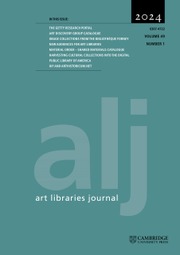This issue of the Art libraries journal brings together six articles based on presentations and talks given at the ARLIS UK & Ireland 2019 Conference, held at the University of Glasgow. All are focused on the broad theme of digital libraries and collections, providing a range of current projects and perspectives.
Holly Hatheway, Roger Lawson and Charlotte Oertel open with an article that introduces a major international digitisation collaboration between several European and American libraries: The Digital Cicognara Library makes accessible online (Open Access) digital facsimiles and metadata for this historical collection of early art historical books. Andrea Lydon has written about Source – Uncovering stories of art in Ireland, a national project in its last stages of completion (2017–2021) to catalogue and digitise archives and documentation related to Irish art held at the National Gallery of Ireland's ESB Centre for the Study of Irish Art. Laura Schwartz discusses the UC San Diego Visual Arts and Architecture Digital Collections, with two case studies that highlight collaborative strategies for art librarians developing local primary source digitisation projects. Sarah Bromage focuses on a recent initiative at the University of Stirling aimed at integrating into a new cross-searchable website images and information related to their archives and art collection.
Digital libraries and collections have over three decades of history. Stefanie Hilles and Alia Wegner reflect on a number of projects based on the Shields Trade Card Collection at Miami University from the 1990s onwards, advocating for art specific methodologies throughout the lifecycle of a digital collection. Closing this issue, Elisabeth Thurlow presents recent work on digital preservation at University of the Arts London and reflects on its importance, as rapid changes in technology and the threat of digital obsolescence present significant challenges to the long-term future of our growing digital collections.
I am grateful to all our contributors for their willingness to reframe their presentations into such a set of compelling articles for this issue.
COVID-19 pandemic
At the time of this issue going into production, late March, the coronavirus disease (COVID-19) pandemic has become a public health emergency unprecedented in modern times, with wide-ranging social and economic implications for many countries around the world. The implementation of social distancing measures have included total or partial public and university library systems closures, museum and gallery closures, and the suspension of public activities in countless educational and cultural institutions in Asia, Europe and North America, currently (see data and resources compiled by IFLA in: “COVID-19 and the Global Library Field” https://www.ifla.org/covid-19-and-libraries)
In this context, digital resources and services are key to libraries being able to continue to fulfil their missions. With the temporary suspension of access to buildings and print and other physical resources, the ongoing pivot to digital is challenging for art libraries, where visual and material qualities are so important to most of our users. Digital collections like those discussed in this issue are critical to achieve this.
It is impossible to foresee at present the medium and long term consequences of the pandemic for art libraries and art documentation, but the ALJ editorial team will endeavour to continue to support our community and to serve as a place for communication and exchange on an international level. However, this is not business as usual. Our publishers, Cambridge University Press, have temporarily suspended print production of journals, and we note the cancellation or postponement of most conferences and other meetings. We aim to publish online on our regular quarterly schedule, or as close to it as circumstances allow. We will also be hoping to communicate with our readers via our social media presence (see https://www.cambridge.org/core/journals/art-libraries-journal).
We profoundly agree with the statement that “It is vital that we all come together to allow reading, learning and research to continue, to ensure that we can minimise the long-term effects of the outbreak on our cultures, societies and economies” (COVID-19 and the Global Library Field: Statement by the IFLA President and Secretary General, 23 March 2020), and we hope to carry on facilitating reflection, criticality and the sharing of ideas and good practice internationally, now and into the future.
We wish our readers and wider community good health and safety in these uncertain and difficult times.


